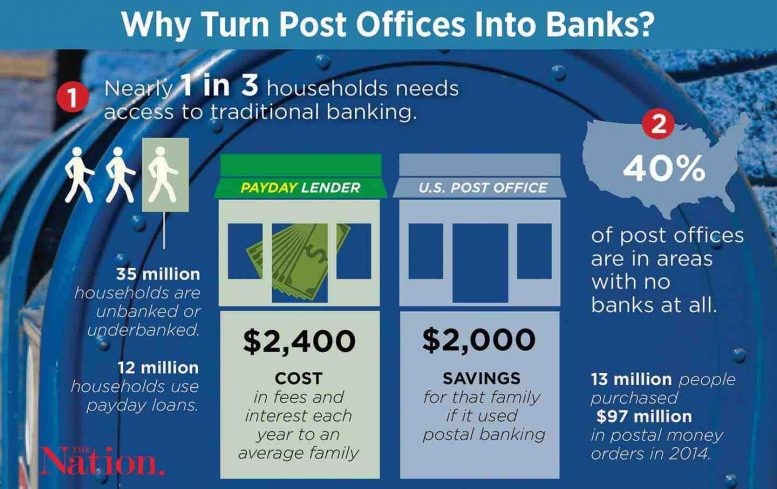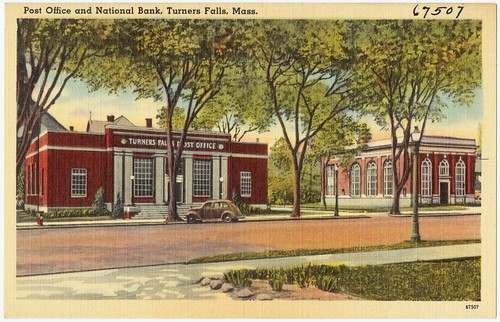I have a friend from law school who spent his entire professional life in Northern Virginia working as a lawyer for a federal agency. Upon retirement, he and his wife became “reverse snowbirds” opting not to go south to the sun-kissed beaches of Florida but rather to move to Vermont. Apparently, the lure of five grandchildren outweighed the warmth of one of God’s most popular waiting rooms.
I don’t know if my friend is a supporter of Vermont Senator Bernie Sanders. In my immediate family, Bernie is either hailed as the second Messiah or as a whack-a-doodle. But even those who do not “feel the Bern” know that even a blind squirrel can sometimes find a nut. The “nut” in this case is Senator Sanders’ proposal to allow the U.S. Post Office to operate as a bank. Since he is joined in this proposal by Congresswoman Alexandra Ocasio-Cortez (AOC), the proposal is a nonstarter in the current political environment. But it is a good idea and one with historical precedent.
The current political kerfuffle over the Post Office has nothing to do with the bank idea but rather with President Trump’s appointment of a Postmaster General who has banned “overtime” in the interest of financial probity. It will insure that mail delivery is slowed at a time when many people will be voting by mail. This will allow the President to continue to cast doubt on the legitimacy of the upcoming November election.
The President continues to insist that the Post Office is “under-charging” Amazon for parcel delivery (should raise prices 4x). Perhaps if Amazon’s CEO, Jeff Bezos, knew what a great deal he had with the Post Office, he would abandon his plan to use Amazon’s fleet of trucks (60,000 with 100,000 more now on order) to deliver almost all its packages and end virtually any reliance on FedEx or the Post Office. The real reason for the “under-charging” argument is that Bezos owns the Washington Post, a purveyor of “fake news,” including the Post’s running tally of the President’s lies or misstatements which now are well north of 20,000.
The Constitution gave the Federal government specific “enumerated powers” and reserved all other powers to the states. The Federal government has grown like Topsy in the last hundred years so it does not appear to be a limited government at all. One of the “enumerated powers” was to establish a postal system which was done with Benjamin Franklin as the first Postmaster General. The United States Post Office is a very popular, if not the most popular, federal agency with 90% of Americans giving it very high marks in poll after a poll.
Now about that bank. It is no secret that it cost a lot of money to be poor. Take, for instance, payday lending. There are more payday lenders in the United States than McDonald’s restaurants and this is true even though 12 states outlaw payday lending altogether.
Payday lending works this way. Say someone needs $100 until their next two week paycheck. The charge for this two week loan is $15 which is a simple interest rate of 15% but an annualized rate of over 400%. If the borrower renews the $100 loan every 2 weeks for a year their cost would be $390 for that $100 loan. According to the Pew Trust, the average borrower is on the hook for a $395 loan five times in the year and pays $530 in fees for that loan.
Payday lenders argue that their service is the only way for certain people to receive cash advances. The payday lender will advance money almost immediately – without a credit check ‒ as long as there is proof of a paying job and access to the borrower’s bank account.
Payday lenders are correct that they fill a real need. Most Americans have virtually no savings and live check to check. Moreover, they argue that if payday lending is banned, their customers will find another way to get cash and that other way will not be regulated at all.
What payday lenders do not say is that payday lending is extraordinarily profitable. This accounts for their overwhelming presence in every poor and working class neighborhood.
Now suppose the Post Office bank makes the same loan but at a simple interest rate of 5% which is an annualized rate of approximately 130%. This is still usurious but the borrower will save over $200 a year. And, if the borrower took the average loan of $395 five times in the year, their yearly savings would be $260. Remember that the average credit card interest rate on an annualized basis is about 29%. And, what if the Post Office bank charged not 160% but 36% as is the law in many states that allow payday lending but cap the APR at 36%?

Every developed country provides for postal banks. The United States had postal banking from 1911 to 1966. While originally proposed for the under banked areas of the South and West, it turned out that the principal customers were recent immigrants in urban areas who had confidence in the government but no confidence in banks. If immigrants did not trust the banks, it is also clear that the banks didn’t trust the immigrants or see them as reliable customers. Fast forward to 1947 when deposits in postal banks reached $3.4 billion with 4 million customers banking at the post office. For a concise history of the United States postal bank, see Slate article.
A rebirth of postal banks will, no doubt, be fought by the banking industry and your average payday lender. There should be a little sympathy for the banks which abandoned poor areas starting in the 1970s leaving them to payday lenders and check cashing services. But it would be a boon to those poor people who are now captive to payday lenders.
Critics will also complain that the Post Office is losing billions of dollars and should not be entrusted with a new responsibility such as a bank. It is true that the Post Office has lost money for years, revenue dropping as a result of the sharp decline in first class mail brought on by the use of email. However, on the expense side, every time the Post Office tries to save money (mail five days a week rather than six; closing inefficient post offices), Congress passes a law to forbid it.
However, the Post Office’s real burden results from a congressional law in 2006, which required the Post Office to set aside billions of dollars for retirees’ future health care costs. This is required of no other Federal agency. One of my college classmates, who is a Professor of Business at Notre Dame, has written an explanation for this which can be found at Notre Dame News.
Of course, there will be the argument that a government agency should not be allowed to compete with “private enterprise” and that this is a step to “socialism.”
The Bernie/AOC proposal would be a postal bank on steroids. One doesn’t have to go that far and it seems better to stay small and focused. Suppose, for instance, the new postal banks offer basic checking accounts, savings accounts, loans up to $500 and continue to sell other financial instruments like money orders.
Will this solve the growing wealth inequity between the rich and the poor? No, but it might be a small solution. Like the immigrants, the poor would have an outlet to deposit their savings and to take out a small loans necessary to pay the rent or buy groceries.
All in all, I am “feeling the Bern” on the subject of postal banks. If that makes me a socialist, so be it.
